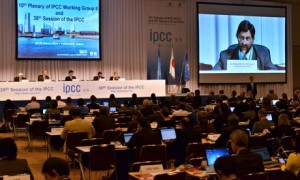“Human interference with the climate system is occurring, and climate change poses risks for human and natural systems.” IPCC WGII AR5
The Intergovernmental Panel on Climate Change (IPCC) recently released Part 2 of its Assessment Report showing that work to limit the effects of climate change must begin now. Part 1 came out in September 2013 and showed indisputable evidence that climate change is real, it is happening today, and human influence is the root cause. The report is the fifth such report that has come from the UN.
This week, government officials and top climate scientists are meeting in Berlin to review a 29-page draft from working group 3 of the UN’s IPCC. This third document is expected to be released later this month.
The scope of the second report takes a broad look at how climate change is impacting the Earth’s oceans, coasts, atmosphere, animals, humans and human societies. The report then examines how we must adapt to manage risks associated with climate change.
This is a stern warning coming from the world’s scientific community, and there is little doubt from the experts about the solution: cut pollution from fossil fuels and prepare for the risks associated with a warming world.
The document warns of side effects from a warming world over the next century. There is a high level of consensus from the scientific community that there will be a rise in sea level from melting glaciers, which threatens coastal cities and low-lying nations. There will also be an increase of drier areas, resulting in increased wildfires and drought.
Part of the problem with climate change is that scientists don’t have a crystal ball to predict how the environment will respond to a rise in temperatures. They are trying to predict effects of climate change over the course of decades. Scientists are anticipating that forests ecosystems could collapse and wetland ecosystems could disintegrate. They are expecting that water systems worldwide will be effected from more flooding in many places and drought in drier regions. Of course, the effects won’t be uniform everywhere.
Scientists are also noting that there could be some localized positive effects from climate change. They say that there will be fewer deaths from severe cold, but scientists are also anticipating more deaths due to heat. Some parts of the planet may become better suited for agriculture, especially in higher altitudes, but lower crop yields in other areas will outweigh those benefits. Also, scientist predict that fish and aquatic life will move around as ocean temperatures rise. However, there could be effects, both good and bad, that scientists are not expecting.
The experts are warning the world’s leaders that in order to prevent the worst consequences of climate change we need to reduce pollution, and inaction today will reduce the world’s options for managing the worst effects of climate change.
The level of carbon dioxide is up 41 percent since the Industrial Revolution nearly 200 years ago, and it could double in a matter of decades if the present trend continues.
Unfortunately, here in the US, climate deniers have hijacked the Republican Party and have stalled any meaningful debate about what we are going to do to combat climate change.
“There are those who say we can’t afford to act,” Secretary of State John Kerry said in a statement. “But waiting is truly unaffordable. The costs of inaction are catastrophic.”



